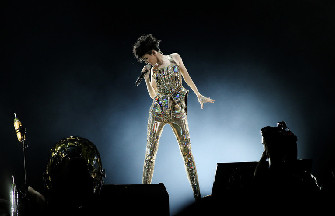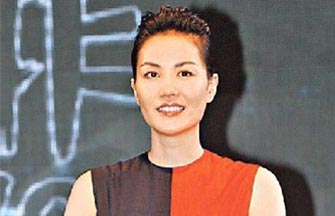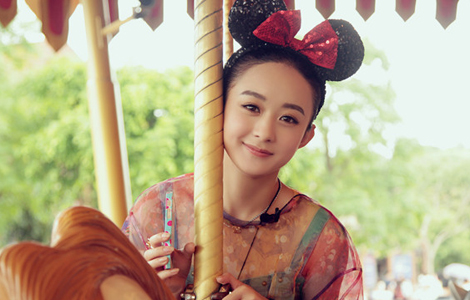New page turner
Updated: 2014-09-03 07:26
By Liu Zhihua and Xing Yi(China Daily)
|
||||||||
The Beijing book fair witnessed a rise in foreign demand for contemporary Chinese literature but authors here say more needs to be done. Liu Zhihua and Xing Yi report.
Ahmed Alsaeed, a copyright agent from Egypt, had little time to catch his breath during the 21st Beijing International Book Fair, held from Aug 27 to 31, but the running around helped him.
He managed to sign contracts with eight leading Chinese publishing houses to translate and publish the books of Chinese authors in the Arab world, including those of Zhou Daxin and Liu Zhenyun.
Zhou and Liu are both winners of the Mao Dun Literature Prize, a top literary award in China.
Alsaeed, who represents the Arab Publishers' Association in China, an organization under the Arab League, also increased the number of his Chinese publishing partners to 25 in the course of this year's book fair in Beijing.
"Publishers and readers often ask me if I have Arabic versions of some Chinese books," Alsaeed says.
"Arab people used to have little interest in Chinese literature, but they have shown interest in reading books by Chinese authors in the past two or three years."
He credits the change to China's rise on the international stage, and says that Chinese author Mo Yan's winning of the Nobel Prize in literature in 2012 made the world notice Chinese literature.
In 2013, the book fair witnessed a total of 3,667 copyright deals being signed, an 11-percent year-on-year increase, including for some 2,091 export copyright deals, according to the China Publishing and Media Journal, a Beijing-based industry publication.
Moreover, in the past, most books that found their way to the libraries of Western readers were about traditional culture or beauty and sex, but now contemporary Chinese literature has begun to dominate such collections, according to the journal.
Of the 37,640 titles of Chinese books collected by more than 20,000 overseas libraries in 2013, some 79 percent is on contemporary literature, one of its reports released during the book fair says.
"There was always a demand from abroad for Chinese literature, but somehow, the market demand seems to have increased in recent years," says Lu Nan, who works in the international cooperation department of the People's Literature Publishing House.
The publishing house started to export literature copyrights in the 1990s, primarily to Hong Kong, Taiwan, and some Asian countries and regions, such as Vietnam.
Now, through cooperation with prestigious international publishers and agents, it is able to sell contemporary Chinese literature copyrights in Western markets.
However, according to the journal's report on overseas libraries' collection of Chinese books, only 9 percent of about 400,000 titles published in China in 2013 were collected by overseas libraries.
Chinese publishers tend to believe that even Mo sold only about 10,000 copies of his books in foreign languages in the past decade.
Lu says that most of the contemporary Chinese literature sold to Western buyers by the People's Literature Publishing House first needed to be pitched to foreign publishing houses or copyright agencies by the Chinese.
Mai Jia, perhaps China's most widely recognized writer in the West, recently spoke about the popularity of Chinese literature in the global arena. "My book couldn't have been as successful as it is now (in foreign countries) if it had come out 10 years ago," Mai says.
China's rapid economic progress in the past three decades has made foreign readers curious about China, which in turn has helped draw attention to Chinese writers such as himself, he adds.
"However, my success was a stroke of luck and as a group, Chinese writers still have little influence globally."

 Star Stefanie Sun holds concert in Beijing
Star Stefanie Sun holds concert in Beijing
 Faye Wong's manager refutes star's drug rumors
Faye Wong's manager refutes star's drug rumors
 Lu Yi and daughter Bei Er pose for street snaps
Lu Yi and daughter Bei Er pose for street snaps
 Photoshoots of actress Li Xiaomeng
Photoshoots of actress Li Xiaomeng
 Council of Fashion Designers of America Awards
Council of Fashion Designers of America Awards
 Fan Bingbing, first Chinese actress in Barbie Hall of Fame
Fan Bingbing, first Chinese actress in Barbie Hall of Fame
 Awarding ceremony of 2014 hito Pop Music held in Taipei
Awarding ceremony of 2014 hito Pop Music held in Taipei
 Zhao Liying's photo shoot for Children's Day
Zhao Liying's photo shoot for Children's Day
Most Viewed
Editor's Picks

|

|

|

|

|

|
Today's Top News
US doctor in Liberia tests Ebola positive
China's August PMI decreases, but slightly
Monopoly probes treat firms equally
Gene to fight Parkinson's discovered at UCLA labs
China's Uncle Sam ready to test US market in NYC
Beijing spruces itself up for APEC summit
New Budget Law to change the game
Microsoft asked to explain monopoly accusations
US Weekly

|

|







